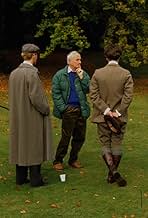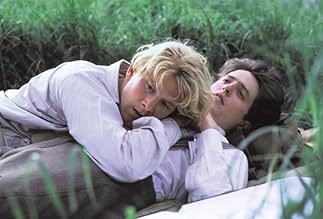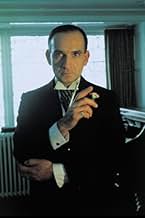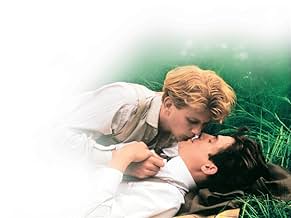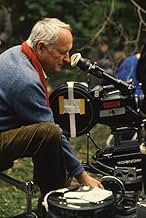AVALIAÇÃO DA IMDb
7,6/10
26 mil
SUA AVALIAÇÃO
Depois que seu amante o rejeita, um jovem preso pela opressão da sociedade eduardiana tenta chegar a um acordo e aceitar sua sexualidade.Depois que seu amante o rejeita, um jovem preso pela opressão da sociedade eduardiana tenta chegar a um acordo e aceitar sua sexualidade.Depois que seu amante o rejeita, um jovem preso pela opressão da sociedade eduardiana tenta chegar a um acordo e aceitar sua sexualidade.
- Direção
- Roteiristas
- Artistas
- Indicado a 1 Oscar
- 3 vitórias e 2 indicações no total
- Direção
- Roteiristas
- Elenco e equipe completos
- Produção, bilheteria e muito mais no IMDbPro
Avaliações em destaque
Maurice' had a deep emotional impact on me when I first saw it in my early teens, more than ten years ago. I just saw it again for the first time since then and I was a bit worried that I would be disappointed, but then I was definitely not. It still had the same magic.
To me, this is the #1 Merchant-Ivory work. I find this movie astoundingly profound compared to several other of their movies. This movie is above all accomplished by the excellent acting. It tells a pure and convincing story about struggling to be true to oneself in a world of not only prejudice and firm standards but even serious legal sanctions.
I think Maurice' is far more romantic, and sexy, than most heterosexual love stories I have seen. The love and longing of these men seems so real and pure, especially by the fact that they are consistently being told that their inclination is `unspeakable', and their futures and careers are at stake.
It is great to see Hugh Grant in an early role (his first real movie role?) that is so different from the mainstream comedy entertainer he has become. The ending is stunning. I love that the movie ended exactly where it did, although it is a dread to acknowledge that the war would break out soon after. The music score is enthralling. And Alec Scudder is so beautiful that it hurts.
To me, this is the #1 Merchant-Ivory work. I find this movie astoundingly profound compared to several other of their movies. This movie is above all accomplished by the excellent acting. It tells a pure and convincing story about struggling to be true to oneself in a world of not only prejudice and firm standards but even serious legal sanctions.
I think Maurice' is far more romantic, and sexy, than most heterosexual love stories I have seen. The love and longing of these men seems so real and pure, especially by the fact that they are consistently being told that their inclination is `unspeakable', and their futures and careers are at stake.
It is great to see Hugh Grant in an early role (his first real movie role?) that is so different from the mainstream comedy entertainer he has become. The ending is stunning. I love that the movie ended exactly where it did, although it is a dread to acknowledge that the war would break out soon after. The music score is enthralling. And Alec Scudder is so beautiful that it hurts.
"Maurice" (prononced "Morris") is the film adaption of the book by E.M. Forster and stated to be semi-autobiographical of his life. The book was banned for many years and it wasn't until 1987 that this visually splendid film was released from Merchant-Ivory - ("A Room With A View", "Howard's End"). Set in early 19th century England, it details the coming of age story of Maurice Hall, an upper-class aristocrat who falls in love with fellow classmate Clive Durham (Hugh Grant). Shortly after their romance begins, a fellow student is entrapped and imprisoned for soliciting a military officer. Out of fear of losing his inheritance and political future, Clive decides to get married. Although hurt and feeling very alone, Maurice continues a close platonic relationship with Clive. After attempts to "cure" his homosexuality fail, Maurice finds himself falling in love with Clive's gamekeeper, Scudder. With the threat of exposure and blackmail always a real possibility, they must risk everything to build a future together. Supporting performances by Denholm Elliot, Helena Bonham Carter and Ben Kingsley help make this a true classic. The lush and elegant score is available as part a 3-disc set of Merchant-Ivory film scores. Guys, if you're looking for a great "first-date" video, it really doesn't get much better than "Maurice"!
Many viewers and critics have criticised the happy ending of this film as being 'unrealistic' or even 'impossible'. After all an upper class and working class man could never live as a couple in Edwardian England? In fact E.M. Forster's inspiration for writing the book Maurice was a real gay couple, one upper class and the other working class, who lived together openly in England for about 35 years until 1928. They are buried in the same grave.
Edward Carpenter was a close friend of E.M.Forster, who named Carpenter's working class gay partner, George Merrill, as the inspiration for his novel Maurice. He had visited Carpenter and Merrill at Millthorpe in Derbyshire on several occasions: once, in 1913, Merrill "touched my backside - gently and just above the buttocks. I believe he touched most people's. The sensation was unusual and I still remember it, as I remember the position of a long vanished tooth. He made a profound impression on me and touched a creative spring" That was the origin for the writing of Maurice.
Edward Carpenter was a close friend of E.M.Forster, who named Carpenter's working class gay partner, George Merrill, as the inspiration for his novel Maurice. He had visited Carpenter and Merrill at Millthorpe in Derbyshire on several occasions: once, in 1913, Merrill "touched my backside - gently and just above the buttocks. I believe he touched most people's. The sensation was unusual and I still remember it, as I remember the position of a long vanished tooth. He made a profound impression on me and touched a creative spring" That was the origin for the writing of Maurice.
When E M Forster wrote "Maurice" homosexuality was considered a mental illness, a criminal offence, an aberration, a sin against God, (it still is in some quarters). It wasn't so long since Oscar Wilde was jailed for sodomy and Forster, had his own homosexuality become public knowledge, would certainly have found himself in a similar predicament and would never have enjoyed the literary eminence that he did. So consequently, moved though he was to write the book, gave instructions that it should not be published until after his death, and Forster lived for a very long time. When "Maurice" eventually did see the light of day, it seemed terribly dated. 'I'm an unspeakable of the Oscar Wilde sort', Maurice tells his doctor in a feeble attempt to be 'cured' of his 'affliction', and a line which the movie retains. Gay literature had come a long way in the interim and homosexuality was no longer seen as an illness nor a crime.
But Forster's view of homosexuality was, surprisingly, not a tortured, shame-filled one but touchingly, if ridiculously, romantic. When Maurice finally does find true love, it cuts across all barriers including class and has the lovers retreating, like some gay Adam and Eve, to 'the greenwood'. It seems unrealistic but at the same time liberating long before the term 'gay liberation' was ever coined.
James Ivory's screen version is remarkably faithful to the original and consequently risks ridicule in this so-called more enlightened age. But Ivory's intelligence as a film-maker has long been over-looked in favour of an emphasis on his prettified recreations of the past. Yet he remains the pre-eminent chronicler in British cinema, (though American and consistently working with an Indian producer, Ismail Merchant), of a particular period in British history mostly through adaptations of novels by writers of the period or by contemporary authors writing about the period. But when Ivory did adapt 'classic' literature, he concentrated on the best and working mostly with the great writer Ruth Prawer Jhabvala, brought to bear on these adaptations a deeply felt and genuine appreciation of their worth.
Hence "Maurice" is as fastidiously good as we have come to expect, the difference being that this time the script is not by Jhabvala but by Ivory himself and Kit Hesketh-Harvey. In every other respect it looks and feels typically 'Merchant-Ivory', a term some people believe stultified British cinema at a time when other directors were making edgy, contemporary 'new-wave' films. But that is like condemning well-acted, well-crafted Shakespeare just because it's old.
"Maurice" is a superbly acted, visually gorgeous film, though at times its fidelity to its source means that sometimes certain scenes feel stilted, (you make want to give these people a good shaking). And did they need to cast actors as beautiful as James Wilby (Maurice), Hugh Grant, (his first great love, Clive Durham), and Rupert Graves, (the game-keeper Scudder, shades of a gay Lady Chatterly, the boy he finally falls for)? All three play wonderfully well and Ivory populates his film with a cast of wonderful character actors, (Simon Callow, Denholm Elliot, Billie Whitelaw, Judy Parfitt), all playing at the top of their form.
Of course, both book and film have now largely been set aside as dated and irrelevant in the annals of gay literature and cinema. Surely not. The film remains as much an integral part of the history and consequential progress of main-stream gay movie-making as "Brokeback Mountain", (though by no means as commercially successful), as it is an integral part of the Merchant-Ivory stable. Anyone remotely interested in either should seek it out.
But Forster's view of homosexuality was, surprisingly, not a tortured, shame-filled one but touchingly, if ridiculously, romantic. When Maurice finally does find true love, it cuts across all barriers including class and has the lovers retreating, like some gay Adam and Eve, to 'the greenwood'. It seems unrealistic but at the same time liberating long before the term 'gay liberation' was ever coined.
James Ivory's screen version is remarkably faithful to the original and consequently risks ridicule in this so-called more enlightened age. But Ivory's intelligence as a film-maker has long been over-looked in favour of an emphasis on his prettified recreations of the past. Yet he remains the pre-eminent chronicler in British cinema, (though American and consistently working with an Indian producer, Ismail Merchant), of a particular period in British history mostly through adaptations of novels by writers of the period or by contemporary authors writing about the period. But when Ivory did adapt 'classic' literature, he concentrated on the best and working mostly with the great writer Ruth Prawer Jhabvala, brought to bear on these adaptations a deeply felt and genuine appreciation of their worth.
Hence "Maurice" is as fastidiously good as we have come to expect, the difference being that this time the script is not by Jhabvala but by Ivory himself and Kit Hesketh-Harvey. In every other respect it looks and feels typically 'Merchant-Ivory', a term some people believe stultified British cinema at a time when other directors were making edgy, contemporary 'new-wave' films. But that is like condemning well-acted, well-crafted Shakespeare just because it's old.
"Maurice" is a superbly acted, visually gorgeous film, though at times its fidelity to its source means that sometimes certain scenes feel stilted, (you make want to give these people a good shaking). And did they need to cast actors as beautiful as James Wilby (Maurice), Hugh Grant, (his first great love, Clive Durham), and Rupert Graves, (the game-keeper Scudder, shades of a gay Lady Chatterly, the boy he finally falls for)? All three play wonderfully well and Ivory populates his film with a cast of wonderful character actors, (Simon Callow, Denholm Elliot, Billie Whitelaw, Judy Parfitt), all playing at the top of their form.
Of course, both book and film have now largely been set aside as dated and irrelevant in the annals of gay literature and cinema. Surely not. The film remains as much an integral part of the history and consequential progress of main-stream gay movie-making as "Brokeback Mountain", (though by no means as commercially successful), as it is an integral part of the Merchant-Ivory stable. Anyone remotely interested in either should seek it out.
I ran into this movie a long, long time ago, watching the TV news one evening back in 1987. I felt as I couldn't miss it as soon as I realized it had been shot in Cambridge, my favorite place in the world, but all my feelings went much beyond that when I saw it. I didn't feel uneasy about homosexuality at all but it was with that movie that I finally realized it was only love, no matter whether it involved a man and a woman, or two men, or two women.... The set is magnificent, the actors at their best (a great Hugh Grant who was so great as to show how Mr E.M.Forster had become tired with Clive...), and I must say that Mr Ivory did a pretty good job with his version of the story, very well adapted. In fact I do believe the book is superior in many moments but, on the other hand, the film is far far superior in many other moments, and you can't really say this all the times. I suggest everybody should watch it and enjoy it, no matter what your sexual preferences are. A masterpiece, indeed!
Você sabia?
- CuriosidadesIn the DVD extras, Hugh Grant says that because he and James Wilby already knew each other from appearing in Privileged (1982) together, they were able to practice their scenes together at Grant's house the night before Wilby's audition. Grant says that he remembers it "being a surprise to my banker brother when he came home and found me kissing James Wilby in the front room."
- Erros de gravaçãoDuring one of the earlier scenes while Maurice and others are reading/translating with a professor/dean, Maurice is seen clearly wearing a wristwatch. While wristwatches did exist at the time they were rare, and were considered working class so would not have been worn by a gentleman. The wristwatch would not become common until the first world war, when they were given to soldiers to allow them to see the time while both hands were engaged.
- Citações
Maurice Hall: I'm an unspeakable of the Oscar Wilde sort.
- Versões alternativasSome NTSC versions are scanned at 25fps and the running time is short and seems edited but the movie is intact.
- Trilhas sonorasMiserere Psalm 51
Written by Gregorio Allegri
Sung by The Choir of Kings College Cambridge
Courtesy of The Decca Record Company LTD.
Principais escolhas
Faça login para avaliar e ver a lista de recomendações personalizadas
- How long is Maurice?Fornecido pela Alexa
Detalhes
- Data de lançamento
- Países de origem
- Centrais de atendimento oficiais
- Idioma
- Também conhecido como
- Moris
- Locações de filme
- Empresas de produção
- Consulte mais créditos da empresa na IMDbPro
Bilheteria
- Orçamento
- £ 1.577.000 (estimativa)
- Faturamento bruto nos EUA e Canadá
- US$ 2.484.230
- Fim de semana de estreia nos EUA e Canadá
- US$ 49.278
- 20 de set. de 1987
- Faturamento bruto mundial
- US$ 2.643.324
- Tempo de duração
- 2 h 20 min(140 min)
- Mixagem de som
- Proporção
- 1.66 : 1
Contribua para esta página
Sugerir uma alteração ou adicionar conteúdo ausente


